Dear thinkers,
In a month from now, we’ll get together to dive into ethical thinking. Ethics of course rings a familiar bell to you. You have undoubtedly heard or read about ethical problems surrounding emerging technologies such as artificial intelligence or techniques such as cloning. These phenomena force us to ask questions that pertain, in the last instance, to what it means to be human. But it doesn’t have to get so “dramatic.” Ethical conundrums are in fact everywhere. On a regular basis we are confronted with – smaller or bigger – moral issues and dilemmas.
That doesn’t mean we are always engaged in ethical thinking or ethical reasoning. There is a difference between moral reasoning – something we are engaged in often – and ethical reasoning. Both are about the same subject matter: questions about right or wrong, good or bad, values, the welfare of people et cetera. “What should we do?” “How should we live?” However, while the term “moral” connotes the decision-making, action or behavior itself (we will briefly go into the terminological intricacies during the class), ethics is the purposeful and systematic reflection upon morals and morality – the “science of” morals and morality, if you will. So, put simplistically, while moral reasoning is something that we do day in day out (possibly implicitly), ethical thinking has to be deliberately practiced and cultivated (note the word “systematic”). Ethical reflection will mostly be called for when problems appear that upset our taken-for-granted assumptions or ways of doing, e.g., as concerns euthanasia, abortion, assisted reproductive technology, genetic modification and so on. Often, ethics committees will be formed to help make societal decisions on these matters.
We don’t need a committee, nevertheless, to deploy the instruments of ethical thinking for the benefit of our “thinking” as such. This is what we will try to do in the class, and with which you will start through the assignments I will present shortly. Ethical thinking is old; it goes back largely to the beginning of philosophy (NB: we will only be dealing with the Western tradition here; which is not a way of saying that for instance Eastern philosophy is not worth our time – on the contrary, it is to state clearly our “bias,” acknowledging that there are other perspectives as well). Throughout the history of philosophy, ethical theories have been developed, a few of which have become “canonical.” One may discuss that canon, but certainly the theories figuring in it are time-tested. To wit, there are three big theories that you will find back in any overview or introduction to ethics: deontological, consequentialist and virtue ethics. Sometimes, a fourth big theory is added to the list: contractarianism. Just skip over these terms for now. You’ll read all about them in the reading assignment and we’ll further discuss them when we meet. To keep things simple, these theories each correspond with consideration of:
- principles (-> deontological ethics)
- (end) consequences (-> consequentialist ethics)
- agreements (-> contractarianism)
- virtues (-> virtue ethics)
For the assignment, you’ll work with these four terms or “strategies.” The assignment is three-tiered:
1) Fill in this ethics quiz. It’s just a playful exercise for yourself to get you into “ethical mode,” nothing more. You’ll find the questions are nothing spectacular, and indeed, as mentioned, moral issues are everywhere in life (you’ll also notice they the questions are geared toward the American context, but with some imagination you can probably transpose them to your own cultural or personal background). This exercise is first of all meant to orient your mind toward the kinds of problems ethical reasoning is about. You may already keep the four terms (principles, consequences, agreements, virtues) in the back of your head while filling in the test, but you don’t need to explicitly use or work with them.
2) Once you’ve finished the quiz, and now that you’ve got your moral juices flowing, it’s time to take a closer look at the four terms: principles, agreements, virtues, consequences. As we will find, the boundaries between these strategies and the corresponding theories may be blurry, and at certain points the theories are interlinked. Let’s get more “conceptual” and look into them more deeply. Please read this article on the Internet Encyclopedia of Philosophy.
I’d like you to read this overview article thoroughly, and, if you have time, skim the separate articles on the four aforementioned theories:
- https://www.iep.utm.edu/kantmeta/#H8 (only Sections 8 and 9) (NB: it’s not that deontological ethics completely overlaps with Kantian moral philosophy, but surely Kant is its most famous representative.)
- https://www.iep.utm.edu/conseque/
- https://www.iep.utm.edu/virtue/
- https://www.iep.utm.edu/soc-cont/
A few notes: the overview article focuses on the “big three” (for a nice overview of these, see: http://www.ethicsupdates.net/theories/index.shtml). Contractarianism (or social contract theory) is only mentioned briefly. Also, the section on meta-ethics is at this stage less important; devote most of your attention to Sections 2 and 3, which are about normative and applied ethics, respectively.
3) Discussion case: “Megxit”
Why yes, let’s indulge in some royal soap opera! Just a bit of a frivolous topic to start off with (no worries, we’ll talk about life and death later). British prince Harry and his wife Meghan recently decided to depart from the royal family and step back as senior royals. You are thinking: what? Are we supposed to think seriously about such a gossipy issue? And yet, despite its trivial appearance, there are some substantial moral questions at play here. Remember, Princess Diana died in a car accident in 1997 being chased by paparazzi (oh, there’s your death already). True enough, the Megxit case may be fodder for the not-so-noble human desire for gossip and Schadenfreude, but at the same time it reaches deep into fundamental themes of societal organization (and a changing society), culture, politics, (personal) values as well as the branch of applied ethics called media ethics.
I’m asking you to make an exploratory ethical evaluation of Megxit. First, if you haven’t been following the news, read up on it: what happened, opinions about it, … (a good place to start off may be the website of the British newspaper The Guardian). Try to gather as much information as you can.
Then, briefly define stakeholders: who is involved? (Careful: more people might be involved than would appear at face value.) Subsequently, try to define some of the values that are at stake: autonomy, family, friendship, love, (self-)respect, … Just list these without adding any other comment.
Then, most importantly – and this will also take up most of your time – take the “PAVE resource sheets” you find here (Principles, Agreements, Virtues, End Consequences) and use them to approach the case. Go through the questions that you find on the sheets, for each of the terms/strategies (P, A, V and E), and use these questions to reflect on Megxit (not all questions may apply).
Ethical thinking is no exact science. There is no “one” way to go about this. So, you can’t go wrong! Try to be exhaustive, but don’t expect to. Ethical thinking takes its cues from other forms of thinking, discussed in the course (like some of these are also interwoven with each other). You can use this to your advantage. Apart from that, just stick as much as possible to the four strategies/terms, using what you have read in the reading assignment as a general background. And even those big theories aren’t “holy” guidelines to stick to. They are just there to help, and you’ll quickly notice – as we’ll discuss – that they each have their shortcomings. Ethical reflection is almost never “done,” it’s always “ongoing.” Real life of course forces us to make decisions every now and then. But here, we’re first of all concerned with training ourselves and getting better at the practice.
Please write up your thoughts in brief form (max. 2-3 pages) and send a pdf of that “report” to me (Yoni.Van.Den.Eede@vub.be) by Sunday February 16th at the latest.
Good luck, and see you soon!
Kind regards,
Yoni Van Den Eede


